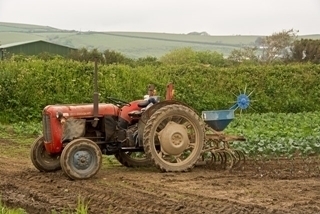But industry groups have warned that many farmers are still left in the dark over the future direction of their businesses, with notable concerns including future costs
.
The government is bringing in a new regime of support for farmers:
Schemes targeted at enhancing the environment, protecting the countryside, improving the productivity of the farming sector and improving animal health and welfare. “So will it be a ground-breaking scheme that delivers once-in-a-generation change or is there a danger its rollout will be met by low uptake and disappointment?”
Environmental Land Management scheme: worth the wait? – Vision Group for Sidmouth
And today, it announced the next steps:

Defra secretary George Eustice is set to unveil plans at the Oxford Farming Conference (OFC) for two new Environmental Land Management (ELM) schemes which will pay farmers in England to restore natural habitats on up to 300,000ha of land. The Local Nature Recovery (LNR) scheme, seen as a more ambitious successor to Countryside Stewardship, will pay farmers for locally targeted actions which make space for nature in the farmed landscape and countryside, such as creating wildlife habitat, planting trees or restoring peat and wetland areas.
Landscape and Local Nature Recovery: What farmers need to know – Farmers Weekly
With the official announcement here:
Today we published more information on Local Nature Recovery and Landscape Recovery – which, along with the Sustainable Farming Incentive, make up our 3 new and ambitious environmental land management schemes. We also published a document summarising the environmental and climate outcomes we plan to achieve through the 3 schemes. And, in case you missed it, we released more details about the Sustainable Farming Incentive in December last year. They follow a speech given by the Environment Secretary, George Eustice, at the Oxford Farming Conference today. It sets the schemes in the wider context of the other exciting changes we’re making over the Agricultural Transition Period.
Get ready for our 3 new environmental land management schemes – Future Farming
Farmers are a bit jittery, though, about the future:
“The government and ministers needs to create an agriculture policy which had a resilient food supply chain ‘at its heart’.”
An uncertain future for farming – Vision Group for Sidmouth
In turn, the Daily Mail has over-reacted a bit – or, at least its chief correspondent, who seems to have a problem with ‘the Goldsmiths’:
‘Leave us alone to do what we do best’: Fury at plan to hand millions to farmers to turn 741,000 acres of land into nature reserves as ‘rewilding cult’ loved by Carrie’s pals the Goldsmith brothers forms centre of shake-up
- George Eustice launches £2.4billion-a-year plan replacing EU’s £2.4bn common agricultural policy
- Farmers and landowners will be paid for planting trees and restoring wetlands in 15 new nature reserves
- The ‘landscape recovery scheme’ will eventually cost the taxpayer £800million a year from 2028
- But there are concerns about risk to food security and policy will benefit Britain’s richest landowners
- Farmers say Boris Johnson’s ‘mad’ obsession with rewilding will drive smaller farmers out of business
- Ministers claim plans will turn 741,000 acres into wildlife habitats in 20 years and will not risk food supply
Anger at rewilding plan to hand millions to farmers to plant trees | Daily Mail Online
The Farming UK website is a bit more nuanced:
The government has unveiled the next stages of its plan to pay farmers for actions which benefit the environment, but industry groups warn that many farming businesses are being left in the dark over their future… But industry groups have warned that many farmers are still left in the dark over the future direction of their businesses, with notable concerns including future costs and the exclusion of tenant farmers from participating...
The NFU said its biggest worry was that the schemes would result in reduced food production in the UK, leading to the need to import more food from countries with lower production standards.
Responding to today’s announcement, the union’s vice president Tom Bradshaw said more information was needed from the government. “While it is encouraging that sustainable food production is recognised, there is still a lack of detail on how it fits in with the schemes’ ambitions to improve farm biodiversity, restore peatlands and manage woodlands. This lack of detail is preventing farmers from making crucial long-term decisions that are essential to them running viable and profitable businesses.” He added: “There are still a number of questions that need answers, not least the costs farmers are likely to incur from participating in these new schemes and how the schemes are accessible right across the country and for every farmer. Currently there appears to be a lack of options for tenant farmers to get involved and this must be addressed as a matter of urgency.”
Defra unveils next stages of ELM schemes but concern remains – FarmingUK News
Meanwhile, green groups are pushing for more nature-based approaches:
Urging the government to make new year’s nature resolutions – Vision Group for Sidmouth
.